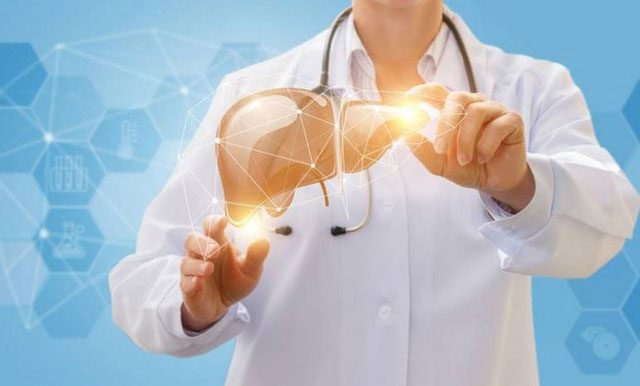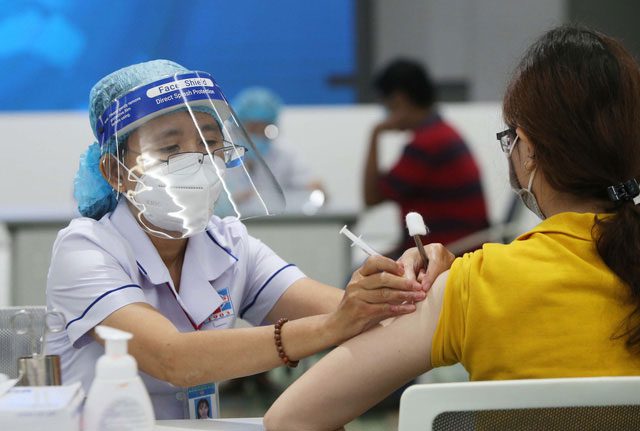Recently, Deputy Minister of Health Nguyen Truong Son signed and issued Decision 3802/QD-BYT regarding the issuance of “Temporary Guidelines for Screening Before Covid-19 Vaccination”, applicable to all healthcare facilities and both public and private vaccination centers across the country. This decision takes effect from August 10 and repeals documents No. 2995/QD-BYT and No. 3445/QD-BYT concerning the issuance of temporary guidelines for screening before Covid-19 vaccination Covid-19.
Currently, many individuals suffering from liver diseases such as hepatitis B, C, and other liver conditions are concerned about Covid-19 vaccination, including: What is the condition of the disease that qualifies for Covid-19 vaccination? When should vaccination be postponed? Does vaccination affect ongoing treatment?…
First and foremost, we must affirm that vaccinating the population against Covid-19 is essential in the current Covid-19 situation. According to the guidelines, individuals with liver disease can be classified for Covid-19 vaccination as follows:
- Cases that should postpone vaccination
- Cases that require caution when vaccinating
- Cases that qualify for vaccination

Liver diseases have various forms and conditions, so careful screening is necessary for Covid-19 vaccine recipients.
Individuals with acute liver disease, progressive chronic hepatitis showing clinical symptoms such as fatigue, loss of appetite, mild fever, jaundice, and elevated liver enzymes belong to the group that should postpone Covid-19 vaccination.
Cases of advanced cancer (liver cancer) and decompensated cirrhosis, liver failure with clinical symptoms and coagulation dysfunction such as low platelet count and decreased prothrombin ratio also belong to the group that should postpone Covid-19 vaccination.
Individuals with acute or chronic liver diseases, including stable compensated cirrhosis and inactive chronic hepatitis B without treatment indication, are eligible for vaccination.
Patients with liver disease who are stable in treatment mean they are clinically normal, liver enzymes are not elevated, and there are no signs of decompensated cirrhosis.
Conditions for Covid-19 Vaccination Eligibility
According to the guidelines, eligible groups for vaccination are: Individuals within the age range recommended for vaccination according to the manufacturer’s guidelines and not allergic to any active ingredients or any excipients in the vaccine formulation.
Many cases of chronic hepatitis B without an indication for antiviral treatment, including those with high HBV DNA levels but liver enzymes below twice the normal level, are eligible for vaccination.
Cases of chronic hepatitis C who have been cured, are currently on direct-acting antiviral treatment, or have not been treated but have normal liver enzyme levels are also eligible for vaccination.

Accurate screening before Covid-19 vaccination is necessary to avoid missing eligible individuals.
Advice for Individuals with Liver Disease During the Covid-19 Pandemic
Patients diagnosed with inactive hepatitis B who do not require treatment, as well as those with hepatitis B and C who are currently being treated, especially stable hepatitis B patients, should be fully aware of their health status, current treatment methods, and may discuss with their treating physician about their health condition and the possibility of receiving the Covid-19 vaccine before going for vaccination, if necessary.
When arriving at the vaccination site, it is important to inform the vaccination facility about the liver disease status prior to vaccination, and it is best to bring along the medical record from the treating physician.
Individuals with liver disease who pass the screening and are eligible for vaccination should follow the same post-vaccination care instructions as all other vaccinated individuals without liver disease.
Another important note for patients currently being treated for hepatitis B and C during this Covid-19 outbreak is:
In addition to needing to get vaccinated, you must continue to take your medication regularly. Do not stop taking medication before or after vaccination, as vaccination does not affect ongoing or previous treatments.
Stopping treatment can affect treatment efficacy (leading to hepatitis flare-ups, drug resistance, complications of cirrhosis, liver cancer). If you cannot visit a healthcare facility for follow-up treatment due to lockdown, bring your prescription to a pharmacy to obtain medication or call your treating doctor for advice.
Dr. Cao Thi Thanh Thuy (Center for Health Examination No. 1, Hanoi University of Medicine)


















































